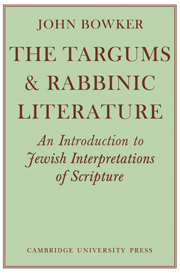Book contents
- Frontmatter
- Contents
- Preface
- Acknowledgements
- Note on the 1979 reprint
- Note on transliteration
- Note on bibliographical references
- List of abbreviations
- INTRODUCTION: THE BACKGROUND OF THE TARGUMS
- PS. JONATHAN ON SELECTED CHAPTERS OF GENESIS
- Appendices
- I The Biblical Antiquities of Philo: a translation of the passages related to Genesis
- II The Seven and Thirteen Rules of Interpretation
- III The Recognised variants in the Septuagint
- IV The Dotted Words in Genesis
- V The Tractates in the Mishnah
- VI Rabbinic Generations
- VII Cairo Geniza Fragments published in Kahle, Masoreten des Westerns, 11, part 2
- Bibliography
- Indexes
I - The Biblical Antiquities of Philo: a translation of the passages related to Genesis
Published online by Cambridge University Press: 01 June 2011
- Frontmatter
- Contents
- Preface
- Acknowledgements
- Note on the 1979 reprint
- Note on transliteration
- Note on bibliographical references
- List of abbreviations
- INTRODUCTION: THE BACKGROUND OF THE TARGUMS
- PS. JONATHAN ON SELECTED CHAPTERS OF GENESIS
- Appendices
- I The Biblical Antiquities of Philo: a translation of the passages related to Genesis
- II The Seven and Thirteen Rules of Interpretation
- III The Recognised variants in the Septuagint
- IV The Dotted Words in Genesis
- V The Tractates in the Mishnah
- VI Rabbinic Generations
- VII Cairo Geniza Fragments published in Kahle, Masoreten des Westerns, 11, part 2
- Bibliography
- Indexes
Summary
The beginning of the world. Adam begat three sons and one daughter, Cain, Noaba, Abel and Seth. (Like Chronicles, Pseudo-Philo opens with the genealogy of Adam, based on Gen. v, but with the addition of many names. The whole of ch. i is devoted to this genealogy, in which a point of particular importance is the treatment of Enoch.)
And Enoch lived 165 years and begat Matusalam. And Enoch lived after he begat Matusalam 200 years, and he begat five sons and three daughters.
But Enoch pleased God at that time and was not found because God translated him.
Now Cain lived in the earth trembling as God decreed for him after he killed Abel his brother and the name of his wife was Themech.
And Cain knew Themech his wife; she conceived and bore Enoch.
Now Cain was fifteen years old when he did these things, and from that time he began to build cities, until he had founded seven cities. And these are the names of the cities. The name of the first city took the name of his son Enoch, the name of the second city that of Maulli, and of the third that of Leeth, and the name of the fourth city that of Teze, and the name of the fifth that of Jesca, the name of the sixth that of Celeth, and the name of the seventh that of Jebbath.
- Type
- Chapter
- Information
- The Targums and Rabbinic LiteratureAn Introduction to Jewish Interpretations of Scripture, pp. 301 - 314Publisher: Cambridge University PressPrint publication year: 1969



